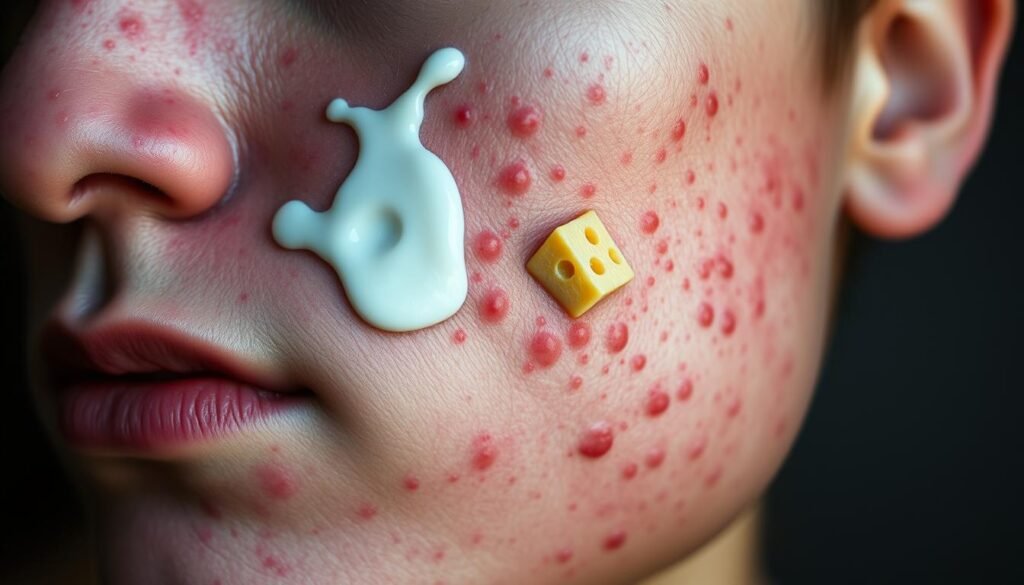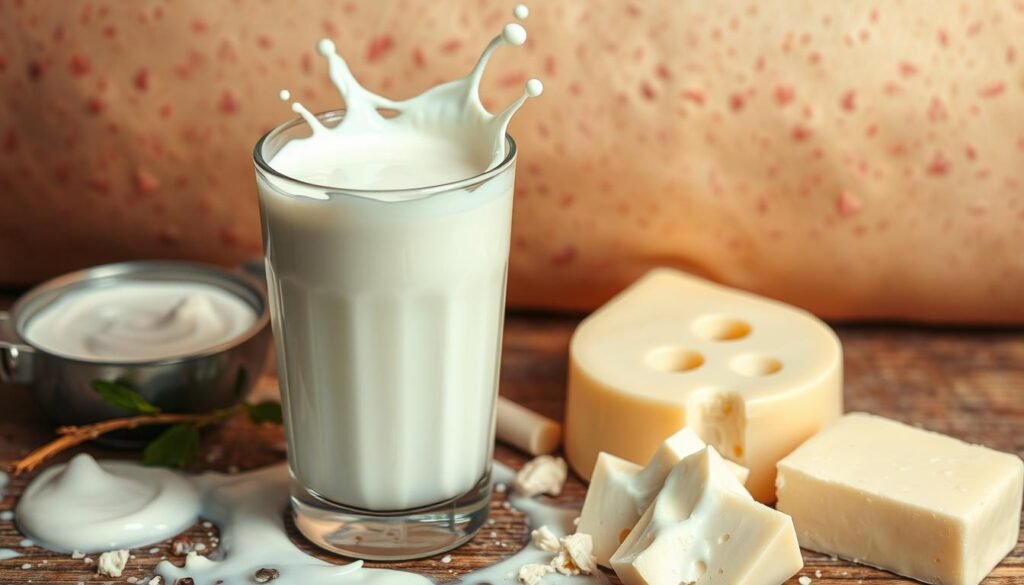Did you know about 50 million people in the U.S. get acne each year? There’s a lot of talk about how dairy might affect acne. While some think dairy causes pimples, research shows it might just make things worse for those already dealing with skin issues. This article looks into how dairy and acne are connected, using science and recent studies.
Knowing the link between Dairy and Acne is key for managing skin health. Dairy’s hormones could mess with our own, possibly making acne more likely. Also, as we eat more dairy and junk food, acne seems to increase. This makes us wonder if changing our diet could help our skin. For more on this, check out an article about busting acne myths.
Key Takeaways
- Acne affects around 50 million individuals in the U.S. every year.
- Some studies suggest skim and low-fat milk may worsen acne more than whole milk.
- Dairy products contain hormones that might disrupt the body’s endocrine system.
- 65% of people may experience lactose intolerance, leading to potential acne flare-ups.
- Cheese does not appear to worsen acne, according to dermatological experts.
- It may take weeks to see skin improvement after altering dairy consumption.
Understanding the Dairy and Acne Connection
Researchers are looking into how dairy might cause more acne for some people. Shanna Miranti, a certified physician assistant, explains that dairy can make acne worse but isn’t the only cause. It’s been found that people who already get acne could see their skin get worse with dairy. The Western diet, full of dairy hormones acne and processed foods, is linked to higher acne rates. This makes us wonder how what we eat affects our skin health.
Current Research Insights
A study in the USA found that out of 2,258 patients on a low-sugar diet, 87% saw their acne reduce, and 91% used less acne medication. In Australia, 43 young men ate a similar diet and most of them had significantly less acne. Also, research from Turkey showed a clear link between sugary diets and severe acne. These findings help show how important a balanced diet is.
How Diet Influences Skin Health
Your diet can really affect your skin, especially when it comes to inflammation. For example, young people drinking a lot of skim milk had a 44% higher chance of getting acne. Another study with 6,094 girls showed that those who drank more cow’s milk had more acne. These findings make it clear that what we eat, like a dairy-rich diet, can influence our skin conditions.
The Role of Hormones in Dairy Products
Dairy products affect our skin health because of the hormones they have. Cow’s milk has hormones that might cause acne. By exploring these hormones, we can better understand why dairy might make skin problems better or worse.
Growth Hormones in Milk
Cow’s milk has growth hormones which can change our hormone levels. Drinking lots of dairy products can mess with our hormones, leading to acne. Studies show, for example, that people who drink a lot of skim milk may get more acne. A big survey of over 47,000 women found that those who drank two glasses of skim milk daily as teens had a 44% higher risk of getting acne.
Insulin-like Growth Factor-1 (IGF-1) and Acne
IGF-1 is a hormone in milk that’s linked to acne. Skim milk raises IGF-1 levels more than whole milk does. Research shows dairy and milk drinking can cause more acne, no matter the fat content. So, dairy can lead to more acne because it changes hormone levels. Skim milk might make acne worse because of the extra whey proteins added in its making. This shows how dairy can affect our skin in complex ways.

Inflammation and Its Impact on Skin
It’s key to know how inflammation, acne, and what we eat are connected. This knowledge is vital for healthy skin. The way skin reacts, especially with acne, is largely due to inflammation. Inflammatory foods can make skin problems worse, causing bigger breakouts. It’s helpful to understand the link between dairy and inflammation. This can lead to positive changes in what we eat.
Understanding Inflammatory Responses
Inflammation sets off a series of body reactions that affect the skin too. Acne is often caused by hormonal changes. Stress, health issues, and what we eat also play a part in inflammation. Foods high in sugar levels, like sweets and fried foods, can make blood sugar rise. This may cause more acne breakouts.
Pro-Inflammatory Foods and Acne
The relationship between our diet and skin health is complex. Certain foods can cause inflammation. Eating dairy is a big concern for those who get acne. Items like whole milk, ice cream, and processed snacks can worsen skin problems. They have properties that cause inflammation. Research shows dairy can increase the risk of more acne spots.
| Food Type | Pro-Inflammatory Effect | Acne Connection |
|---|---|---|
| Whole Milk | High | Increased risk of moderate to severe acne |
| Skim Milk | Moderate | Lower risk compared to whole milk |
| Ice Cream | High | Potential exacerbation of acne |
| Fast Foods | Very High | Linked with cyclic acne outbreaks |
| Processed Snacks | Moderate | Possible aggravation of skin irritation |
Knowing these links can help us spot triggers in our diet. Watching what we eat and noting how our skin reacts can lead to healthier choices. This, in turn, may help our skin look and feel better.
Dairy Products and Their Varying Effects on Skin
It’s important to know how different dairy products affect skin health. This is especially true for those who get acne often. Research shows that dairy products do not all affect acne the same way. Skim milk, for example, is linked to skin problems. Cheese and fermented foods like yogurt might affect the skin differently.
Skim Milk vs. Whole Milk: The Acne Link
Studies suggest skim milk may raise acne risk more than whole milk. This is because skim milk has a higher glycemic index, which can harm the skin. On the other hand, whole milk and options with less fat may not cause as many acne breakouts. People drinking a lot of skim milk could face more acne than those choosing whole milk or lower-fat dairy.
Cheese and Acne: Debunking Myths
There are many wrong ideas about cheese and acne. But, studies show cheese might not be that bad. No clear link has been found between eating cheese and getting more acne. Cheese can be part of a healthy diet and might not harm skin health. Also, fermented dairy like yogurt and kefir could lower inflammation and help the skin.

Looking at different dairy products helps people make better diet choices. For those worried about their skin, it’s good to watch how much skim milk they drink. Advice from skin experts at dermatology clinics can be very helpful. They can give specific tips for acne control and explain dairy’s effects.
| Dairy Type | Acne Impact | Notes |
|---|---|---|
| Skim Milk | High risk | Associated with increased acne due to glycemic index. |
| Whole Milk | Lower risk | Less correlation with acne compared to skim milk. |
| Cheese | No significant impact | Possible nutrient benefits, no clear connection to acne. |
| Yogurt | Possible benefits | May help reduce inflammation and improve skin health. |
Lactose Intolerance and Acne Flare-Ups
Knowing how lactose intolerance links to acne is key for people with skin problems. Around 65% find they can’t digest lactose well after being babies. This can lead to inflammation in the body, which might make acne worse. It’s important to notice how your body feels when you eat dairy.
Signs and Symptoms of Lactose Intolerance
Common signs of lactose intolerance include:
- Bloating and gas
- Diarrhea and abdominal pain
- Nausea after consuming dairy
If you’re lactose intolerant, these issues might also affect your skin, like acne. Watching how your body reacts to dairy gives clues about its impact on acne.
Addressing Dairy Sensitivity
For those linking dairy to acne, cutting out lactose may help. Removing lactose from your diet could clear your skin. Many see their skin get better after this change. Going dairy-free might reduce acne triggers.
Talking to a doctor can help change your diet while getting needed nutrients, like calcium.
The Sugar Content of Dairy and Its Effects
Dairy products can affect skin health, not just through hormones and fat, but also sugar content. Milk has low sugar, but too much sugar can spike blood sugar. This leads to more sebum and inflammation, raising the sugar acne risk. So, it’s key to understand the impact of sugars and dairy on skin health.
How Sugars Impact Inflammation
Refined sugars can make inflammation worse. They cause blood sugar to rise, making the body produce more insulin. This can increase hormones like IGF-1, leading to more inflammation and acne. Studies link high GI foods and more acne. Cutting down these sugars could help lessen dairy and inflammation effects, for clearer skin.
Dietary Sugars and Acne Risk
Studies find that low-GI diets result in less acne, while diets high in sugar and dairy can increase acne risk. For example, South American indigenous people who follow these diets don’t get acne. It helps to choose dairy with less sugar and a low GI. Knowing the sugar acne risk from sugars and dairy aids in healthy diet choices.
| Food Type | Glycemic Index | Typical Sugar Content (per serving) | Potential Acne Impact |
|---|---|---|---|
| Milk | 30 (low) | 12g | Neutral, if consumed in moderation |
| Syrup (e.g., corn syrup) | 70 (high) | 15g | Increases sugar acne risk |
| Ice Cream | 61 (medium) | 13g | Possible pro-acne effects due to sugar and fat content |
| Yogurt (plain, unsweetened) | 14 (low) | 6g | Low risk when sugar is minimized |
| Cheese | 0 (low) | 1g | Minimal impact on sugar acne risk |
Exploring Dairy-Free Diets as Acne Treatment
Switching to a dairy-free diet may benefit those struggling with acne. Studies show that dropping dairy can lower inflammation tied to skin problems. This has sparked interest in dairy-free diet acne treatment for clearer skin.
Potential Benefits of a Dairy-Free Lifestyle
Going dairy-free can boost your health. The key advantages include:
- Reduced Inflammation: Dairy might increase inflammation, making acne worse.
- Clearer Skin: Cutting out dairy often leads to better skin quality.
- Enhanced Nutrient Intake: Avoiding dairy promotes eating foods rich in nutrients, which helps the skin.
Interested readers can find more about dairy-free diets and skin at the relationship between dairy and acne.
Vegan Options for Healthier Skin
Choosing vegan foods is another great way to fight acne. Foods packed with zinc, omega-3s, and vitamins A and E help heal and protect the skin. Here are some top vegan choices for healthier skin:
| Food | Benefits |
|---|---|
| Salmon | Contains omega-3 fatty acids that reduce inflammation. |
| Leafy Greens | Loaded with vitamins A and E for skin health. |
| Berries | Packed with antioxidants to fight inflammation and stress. |
| Nuts | Offer key nutrients for keeping skin healthy. |
| Whole Grains | Help control blood sugar levels, reducing acne flare-ups. |
What to Consider Before Eliminating Dairy
Before changing your diet, it’s crucial to talk with healthcare experts. They can help decide if cutting out dairy to improve acne is a good idea for you. Some people find that dairy worsens their acne, leading them to look for other options. Professional advice is key to fully understanding how your diet affects your skin.
Consulting with Healthcare Professionals
Talking about diet changes with a doctor is important for staying healthy. They can give tips on checking skin health, getting enough calcium, and the impact of dairy on health. Knowing how dairy affects your acne is the first step to finding good substitutes.
Replacing Calcium in Your Diet
If you’re avoiding dairy due to acne, it’s important to still get enough calcium. Calcium is important for strong bones. Below are some alternatives and how much calcium they have:
| Food Source | Calcium Content (mg) |
|---|---|
| Almond Milk (1 cup) | 442 |
| Rice Milk (1 cup) | 283 |
| Fortified Breakfast Cereal (1 serving) | Varies by brand, approx. 100-400 |
| Tofu (1/2 cup) | 253 |
| Broccoli (1 cup cooked) | 62 |
Adding these options to your diet helps replace the calcium you’re missing from dairy. This ensures your bones stay healthy while you manage your skin. With careful planning and expert advice, you can avoid dairy without missing out on key nutrients.

Conclusion
Dairy and Acne have a complex relationship. Dairy might not directly cause acne but can worsen it for some people. Studies show a link between drinking skim milk and a higher chance of acne. This could be due to hormones like IGF-1 or inflammatory dairy proteins.
Eating habits and stress both affect our skin. Managing stress well is key to better skin. To tackle acne, we should look at how dairy and stress together impact our skin health.
If worried about acne, consider changing your diet with a doctor’s advice. Trying dairy-free options like almond milk might help your skin. For tips on dealing with stress and skin, visit this resource. Learn more about dairy’s effect on acne at this link.